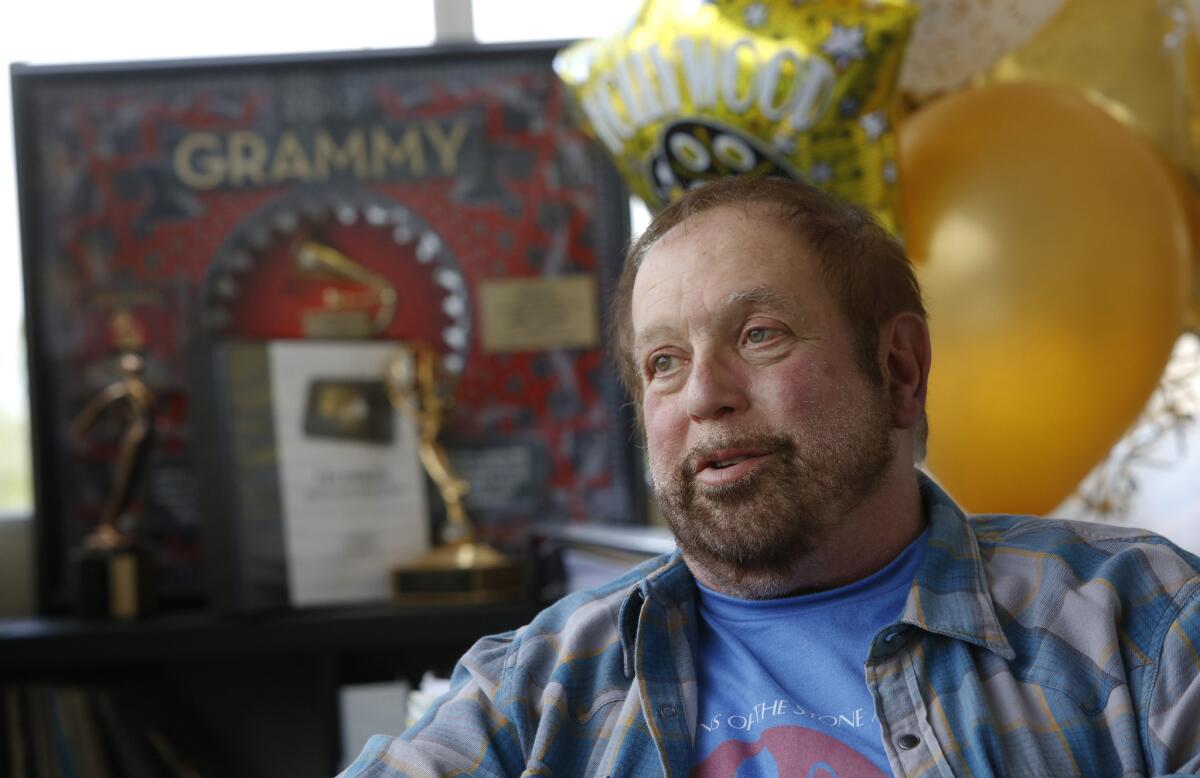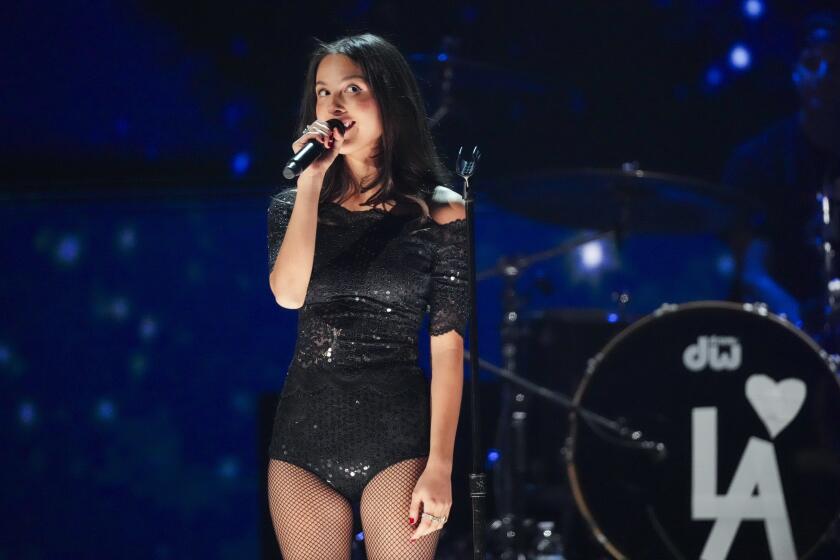Those wild musical pairings on show? Thank Ken Ehrlich

- Share via
Along with the actual handing out of trophies, the annual Grammy Awards ceremony has become as much about unexpected — and sometimes utterly head-scratching — collaborations among disparate musicians for the national TV broadcast.
Just last year, heavy metal band Metallica teamed up with Chinese classical pianist Lang Lang for one of the show’s myriad performance numbers, which also included ex-Beatle Paul McCartney aligned with the surviving members of grunge rock band Nirvana.
Those are in many cases the brainchild of the Grammy telecast’s executive producer, Ken Ehrlich, who since the ‘70s has been doing his level best to make television viewers perk up and ask “what the heck was that?” with musical marriages like those.
Ehrlich, who last week received a star on the Hollywood Walk of Fame in recognition of his 35 years of helping bring the Grammy ceremony to the world, was overseeing a 1970s public television music series in Chicago called “Soundstage” when Hollywood came calling.
“I got an offer to do a four-week tryout for the ‘Tony Orlando and Dawn’ series,” Ehrlich, 71, said late last week between bites of a lean corned beef sandwich at his Encino office, which was buzzing with activity as the 2015 edition of the Grammy show was being assembled. “I booked Frank Zappa onto the show.”
Well, it worked at the time. Eventually, Ehrlich parlayed that experience into a career organizing awards shows and music specials for TV, and his enthusiasm prompted Pierre Cossette, the producer who brought the Grammy ceremony to television in 1971, to invite Ehrlich into the fold in 1980.
“What I learned doing the Tony Orlando show was that weekly television wasn’t for me,” Ehlrich said from a chair positioned midway between 4- by 6-foot bulletin boards filled with postcards push-pinned onto them. On one side, the possible sequence for Sunday’s Grammy show, which will emanate once again from Staples Center in downtown Los Angeles and which will be broadcast by CBS. On the opposite wall, the still-in-the-making lineup for the companion salute to Stevie Wonder and his “Songs in the Key of Life” album, slated to tape two nights later at the Nokia Theatre and due to air Feb. 16 on CBS.
Among the Grammy night collaborations announced so far for Sunday’s show: rapper Kanye West with Rihanna and McCartney, Annie Lennox with Hozier, Gwen Stefani with Adam Levine and Tom Jones with Jessie J.
This year’s show will have 23 performance spots, involving 33 acts. Ehrlich works closely with Record Academy President Neil Portnow and Jack Sussman (CBS-TV’s executive vice president of specials and live events) in crafting each year’s show. It’s a high-wire balancing act — one that almost inevitably leaves some segment of viewers unhappy.
Fans of classical music and jazz consistently bemoan the scant representation of those genres on the telecast, while some of the youngest fans gripe about any performers whose music hasn’t been ubiquitous on YouTube or Top 40 radio.
“We’re celebrating music,” Ehrlich said, “but we’re also putting on a TV show. That means performers who can pull audiences in.”
Their efforts worked last year. Full of high-profile performances by Daft Punk, Pharrell Williams, Wonder, Lorde and Kendrick Lamar, among others, the telecast earned its highest ratings in two decades. An estimated 28.5 million viewers tuned in last year, second only to the Academy Awards among entertainment telecasts.
In addition to making sure all the respective musical trains depart and arrive at their destinations on time, Ehrlich also offers musical guidance.
During rehearsals last year, Green Day singer Billie Joe Armstrong and country firebrand Miranda Lambert were paired to deliver a tribute to pioneering rock and country singer Phil Everly, who had died just a couple weeks before the show was to air.
After a couple run-throughs of a listless mid-tempo rendition of “When Will I Be Loved,” which Everly wrote and turned into a monster hit with his brother Don in 1960, Ehrlich called for a quick huddle with the performers, after which they reemerged with a considerably peppier, more energized take on the song.
“That’s what I do,” Ehrlich said matter-of-factly at the time. With his short reddish hair and beard framing ruddy cheeks and his short, stocky build, Ehrlich has an almost elfin charm, which seems to help defuse tensions that might crop up during discussions with musicians over their interpretive choices.
Ehrlich still works on 10 to 12 special events each year. His passion for these stretches back to 1979, when he supervised a televised music event from the floor of the United Nations, “The Music for UNICEF Concert: A Gift of Song,” an all-star benefit for the U.N. children’s fund that featured Elton John, Donna Summer, Kris Kristofferson, ABBA, the Bee Gees and others.
“That’s when I decided I wanted to spend the rest of my life doing specials,” he said.
Besides the Grammy show, Ehrlich has also produced several Emmy Awards telecasts, 2012’s Grammy salute to Whitney Houston and last year’s 50th anniversary tribute to the Beatles’ U.S. debut on “The Ed Sullivan Show,” which earned six Emmy nominations and one win for musician Don Was for music direction.
But in a conversation about the highlights of a career that goes back nearly half a century, Ehrlich becomes most animated talking not about what he’s done but about what’s still ahead: Sunday’s show and the Wonder tribute coming on its heels.
“I look at how other shows emulate us,” he said. “I’m still competitive. I think about what the other shows did, or didn’t do, think about what we could do better, and it drives me to work harder. It energizes me.”
More to Read
The biggest entertainment stories
Get our big stories about Hollywood, film, television, music, arts, culture and more right in your inbox as soon as they publish.
You may occasionally receive promotional content from the Los Angeles Times.











